The following report is now a complimentary offering from MEMRI's Jihad and Terrorism Threat Monitor (JTTM). For JTTM subscription information, click here.
Introduction
The Salafi-jihadi group Jaish Khalid bin Al-Walid,[1] which was founded in May 2016 basin in southern Syria, in the triangle region known as Hauran, where the Syrian, Jordanian, and Israeli borders meet. There it is fighting the Syrian army, rival rebel forces, and coalition forces.

All signs indicate that Jaish Khalid bin Al-Walid (JKBW) is a branch of the Islamic State (ISIS) in southern Syria. Its methods of operation are identical, as are its fighters' uniforms; its executions of rivals and spies are the same; and its religious police (Hisba) is like ISIS's. Its videos are in the same style as ISIS's, and its photo reports on its achievements in the field and documenting daily life in cities and villages in a similar format as ISIS's. The songs, narratives, and texts that it releases share characteristics with ISIS's as well. It will be recalled also that ISIS's official information outlets and its supporters consider JKBW to be part of ISIS.
Nevertheless, despite all the similarities to ISIS, no oath of allegiance to ISIS by JKBW has yet been released. JKBW has also refrained from mentioning ISIS in its releases, and appears to function as an independent organization, using logos identified with it alone. It is not clear why JKBW is acting as a branch of ISIS without declaring publicly that it is one. It may be that internal disputes among the various factions that comprise it are not willing to fully join ISIS, or that it is convenient for it to appear to be independent to the local residents and to remain unaffiliated with the controversial ISIS. There may also be other reasons that are not evident.
In recent weeks, JKBW was forced to replace its leadership after being targeted twice by the international coalition. On June 28, 2017, the International Coalition fired rockets at a secret meeting of the JKBW commanders in the town of Jalin in the Der'a western countryside, which resulted in the death of the group's leader, Abu Hashem al-Rifa'i, alongside with other high ranking commanders. It should be mentioned that Abu Hashem al-Rifa'i was killed within days of ago, after his predecessor was killed alongside other high ranking ISIS commander by another International coalition's airstrike. At present, as of June 29, 2017, JKBW is led by Abu Taim Inkhil.[2]
This report will review the organization, examine its official releases, and show how it operates as a branch of ISIS without publicly declaring itself to be one.
Background On Jaish Khalid bin Al-Walid
Even before Jaish Khalid bin Al-Walid was established, ISIS supported Liwa'Shuhdaa' Al-Yarmuk, Harakat Muthana, and Jama'at Al-Mujaheedin, which swore allegiance to it. This came as part of ISIS's aspiration to expand its areas of influence to southwestern Syria, where it had less of a presence than in the northeast of the country. A March 16, 2016 article in the Syrian online daily Zaman Al-Wasal shed some light on the two main organizations comprising Jaish Khalid bin Al-Walid.
According to this article, Liwa' Shuhdaa' Al-Yarmuk was established in 2012 by Muhammad Sa'd Al-Din Baridi, aka Al-Khal (i.e. "the uncle"), who swore allegiance to ISIS. In November 2016, Al-Khal was killed together with Liwa' Shuhdaa' Al-Yarmuk's religious leader, Abu Hamza Al-Qurashi, in a car bomb attack; the assassination was attributed to Jabhat Al-Nusra. Al-Khal was temporarily replaced by Qahtan, aka Abu 'Ubaida, who was considered the brain behind Liwa' Shuhdaa' Al-Yarmuk's activity. In early March 2016, there were changes in the organization's leadership, and Abu 'Abdallah Al-Madani, a Saudi, was declared organization commander – officially defined as the Emir of the Yarmuk Basin Region. According to MEMRI's assessment, the appointment of a Saudi as commander of the organization hints at ISIS involvement, since many ISIS fighters and commanders are foreign.
Harakat Muthana, according to the article, was established by Ahmad Kasab Al-Masalme, aka Ahmad Harasta, referred to as an "engineer," who in the 1980s was one of the first Muslim Brotherhood members in Syria and who later went to Afghanistan where he fought the Soviets. In April 2016, Harkat Muthana decided to merge with Liwa' Shuhdaa' Al-Yarmuk, giving the new larger organization a geographic foothold outside the Yarmuk basin, including in the heart of the city of Der'a and in the eastern and western suburbs of the city.[3]
A'maq's Reporting On Jaish Khalid bin Al-Walid
The establishment of Jaish Khalid bin Al-Walid was reported in June 2016 by the ISIS news agency A'maq, as follows: "Dera'a – A'maq Agency: An A'maq source said that Liwa' Shuhdaa' Al-Yarmuk, Harkat Muthana, and Jama'at Al-Mujahideen, situated in the Yarmuk basin, in the triangle where Syria, Jordan, and the Golan Heights meet, have completely merged into a new structure, under the name Jaish Khalid bin Al-Walid."[4] It added, quoting the source, that the purpose of the merger was "to unite the ranks and concentrate the forces" and also was a response to the U.S.'s addition of Liwa'a Shuhdaa' Al-Yarmuk to its list of designated terrorist organizations.
It continued: "The new organizational entity currently controls the cities of Al-Shajra, Jumla, and Nafi'a, in addition to the villages in the Yarmuk basin."
The coverage by A'maq shows the ISIS-Jaish Khalid bin Al-Walid connection, even though the report does not explicitly mention that the new organization belongs to or is officially affiliated with ISIS.
Currently, A'maq continues to cover JKBW activity, but, unlike in most of its releases, which refer to fighters as "soldiers of the Caliphate" and to ISIS, reports concerning JKBW do not, and no connection with ISIS is mentioned. Thus, for example, on June 4, 2017, A'maq reported on JKBW achievements in the fighting against rebel opposition forces near the town of Jalin, in the western countryside of Der'a[5]

A typical A'maq report on JKBW activity: "Thirteen killed, 14 wounded in battle of the armed groups in clashes with Jaish Khalid bin Al-Walid on the outskirts of the town of Jalin in the western countryside of Der'a."
Jaish Khalid bin Al-Walid's Official Announcements Use The Group's Own Formatting
As a rule, the ISIS media system operates in an organized, uniform fashion.[6] Its provinces' announcements on attacks and achievements on the battlefield all look similar.[7]
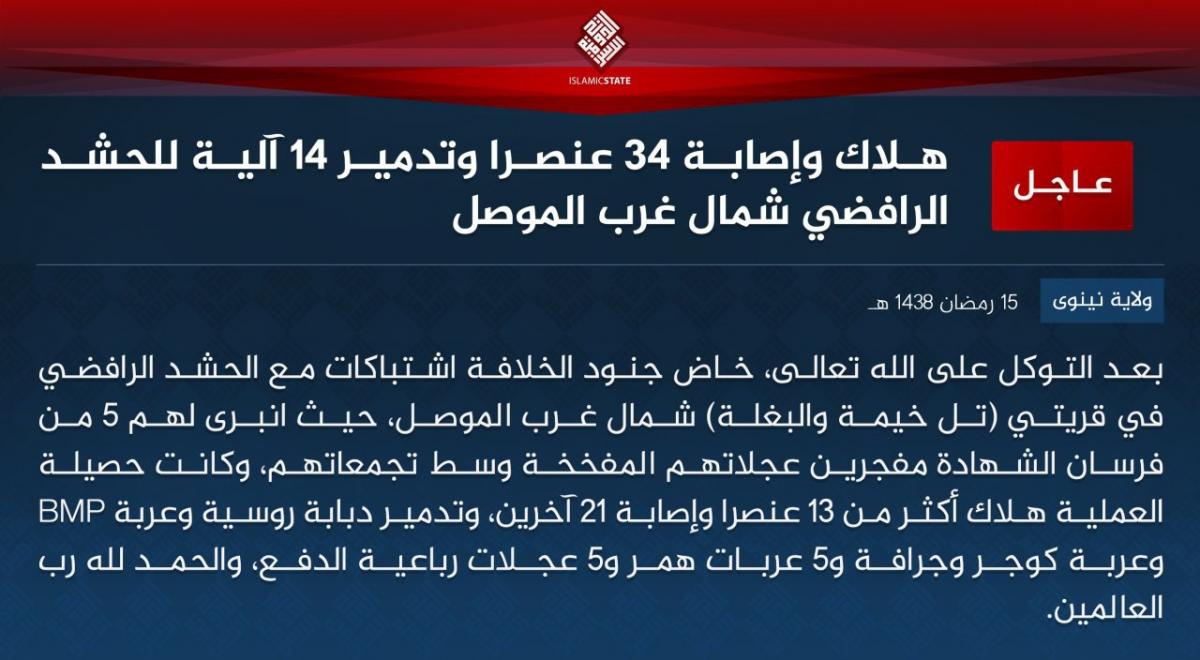
A typical ISIS announcement. It notes the message's degree of urgency, and the name of the province issuing it (here, Ninawa, Iraq), and refers to its fighters as "soldiers of the Caliphate."
Although they use similar terminology and structure, the official JKBW announcements have a different format. The announcement below, a report on the killing of members of rival rebel groups in the outskirts of Der'a, is in the JKBW format, and the fighters it refers to are called "mujahideen."[8] However, it uses terminology that is commonly used by ISIS – for example, "Sahwat Al-Riddah" to refer to the "infidel" militias of local Sunnis.
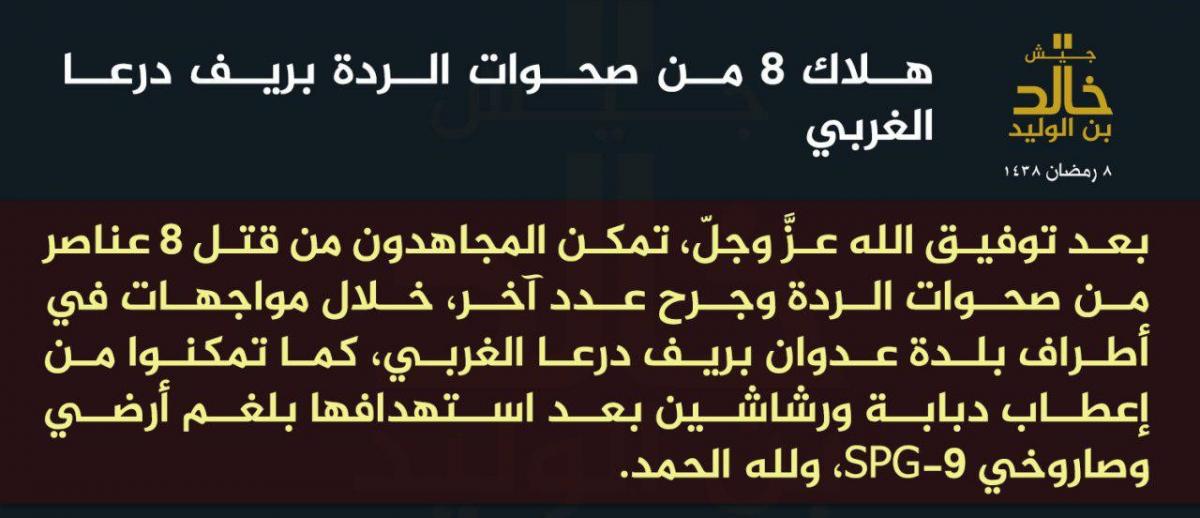
A typical announcement by JKBW. It refers to its fighters as "mujahideen," not "soldiers of the Caliphate," but uses terminology commonly used by ISIS.
ISIS Media Organizations' Support For Jaish Khalid bin Walid
SUPPORT OUR WORK

Just as the ISIS media agency A'maq reports on the JKBW's doings as if it were an integral part of ISIS, so do unofficial pro-ISIS media outlets. On May 8, 2017, the pro-ISIS Al-Battar media organization, published two articles praising JKBW and referring to its fighters were referred to as "mujahideen," not as "soldiers of the Caliphate" or "soldiers of the Islamic State."[9] One of the articles, by Gharib Al-Sururiyya, stated: "In southern Syria, the JKBW has instated shari'a law, destroyed the worshipping of idols, and supported monotheism, sacrificing that which is dear to it for the sake of and to defend the religion of Islam. But then the apostate Sahawat [the rival Sunni militias], that seek to eliminate the shari'a regime and that are supported by the Arab and foreign tyrants [i.e. the international forces] began attacking it... and despite the fierce war on the part of the apostates and the infidels against JKBW, it stood fast, fighting jihad, relying only on Allah. Despite the aid that the apostate Sahawat received to fight this mujahid who protects the believers, everyone learned of the magnitude of JKBW's illustrious victories. Everyone saw the diverse weaponry that it took as booty in the various battles."
The second article, by Abi Abd Al-Rahman Al-Dar'awi (i.e. "of Dera'") also praised JKBW's valor in the war against the rival militias, describing at length how the "Crusaders" (i.e. the Americans) had used the Sunni tribal militias in Iraq when they saw how successful ISIS was. They had, it said, attempted to do the same in southern Syria, but there they encountered JKBW. It stated: "The declaration of the establishment of JKBW, the raising of the banner of monotheism, and the instatement of the laws of Allah on the face of the earth fell upon the Crusaders like thunder on a clear day." It went on to describe how the JKBW "mujahideen" overcame all the difficulties they faced, including the might of the forces that they were fighting, which they subdued.
Official JKBW Videos Include Elements Identical To Those In ISIS Videos
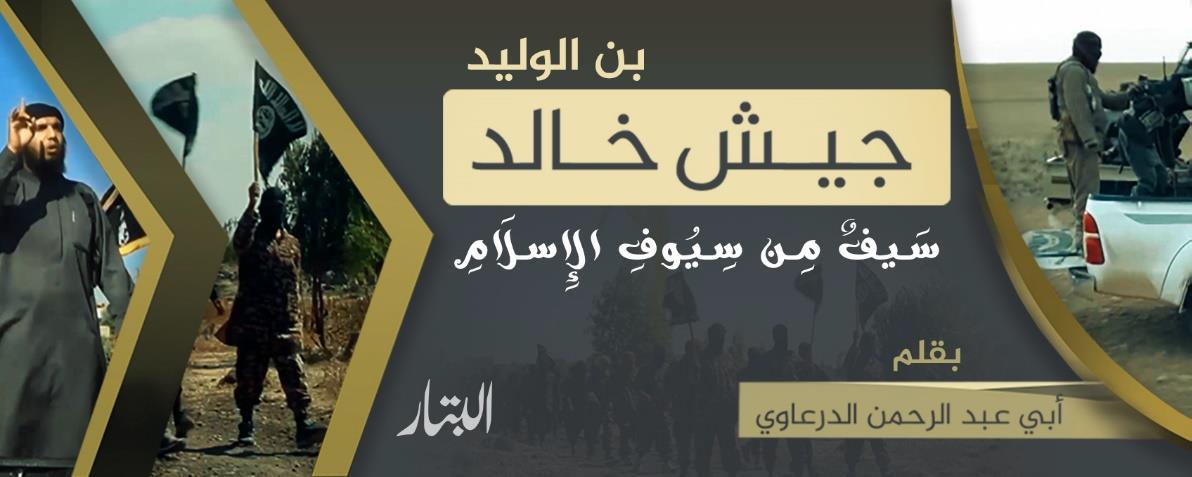
One of the central informational elements used by ISIS inspire its followers is its video productions. Each of its official videos, which are produced locally by the media offices of each ISIS province, has standard elements: dramatic narration accompanied by a soundtrack of ISIS songs; an opening sequence showing the evil deeds carried out by the various enemies against the Sunni Muslims; fighters threatening the enemies; confessions of captured alleged spies, and, for the finale, the brutal execution of these captives.
On March 21, 2017, JKBW released a video titled "Victory Will Come Only Through Steadfastness," that included elements very similar to those of ISIS videos.[10] The opening sequence shows the injustices perpetrated against the Sunni Muslims in southern Syria, stressing that many of them had fled to the Yarmouk Basin and sought refuge with the "mujahideen." The video presented the fighting by the mujahideen of JKBW against the rival rebel organizations, and praised their efforts to rescue the members of their people in the Yarmouk and Horan regions. The speakers in the video use the same language and terminology as do ISIS fighters in ISIS videos from the ISIS provinces in Iraq and Syria, such as the commonly heard "And what is to come will be even worse and more bitter." The video also included scenes similar to those in ISIS videos, such as fighters leading a group of bound prisoners to a place where they are then beheaded. Just as numerous videos from ISIS provinces feature children, so does this JKBW; a little boy is shown handing knives to the fighters to be used for the beheadings.
Although the motifs in the JKBW video are like those in ISIS videos, the only difference, but a significant one, is that ISIS is not once mentioned by name in it. As in JKBW's other releases, the fighters in this video are referred to as "mujahideen," not "soldiers of the Caliphate" or "fighters of the Islamic State."

An element typically seen in ISIS videos appears in the JKBW video as well: A Little boy hands fighters knives to be used in beheading their captives.
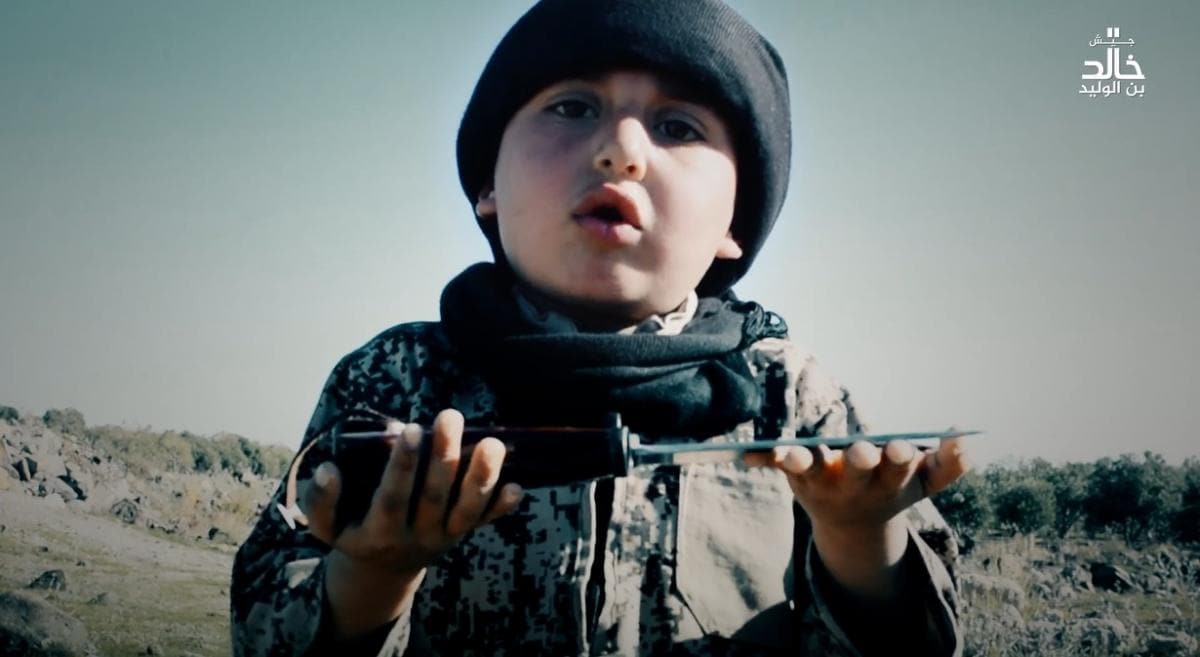
The JKBW video features ISIS-style beheading of captives, with the JKBW fighters in garb similar to ISIS executioners filmed carrying out their task, as in ISIS videos.

The JKBW video features fighters marching with black ISIS flags that feature instead the JKBW name.
JKBW Hisbah (Religious Police): Punishment And Enforcement
In the areas under its control, JKBW operates a Hisbah (religious police force) to enforce shari'a law, along the same lines as ISIS's Hisbah, as is evident from the photos documenting its operation. The JKBW Hisbah's aims are the same as those of ISIS's Hisbah: enforcing prayer times and dress codes, carrying out public punishments for residents accused of crimes, inspecting shops and marketplaces, burning confiscated cigarettes and alcohol, distributing food and alms to the needy, and so on. Following are a number of examples of the JKBW Hisbah's activity:
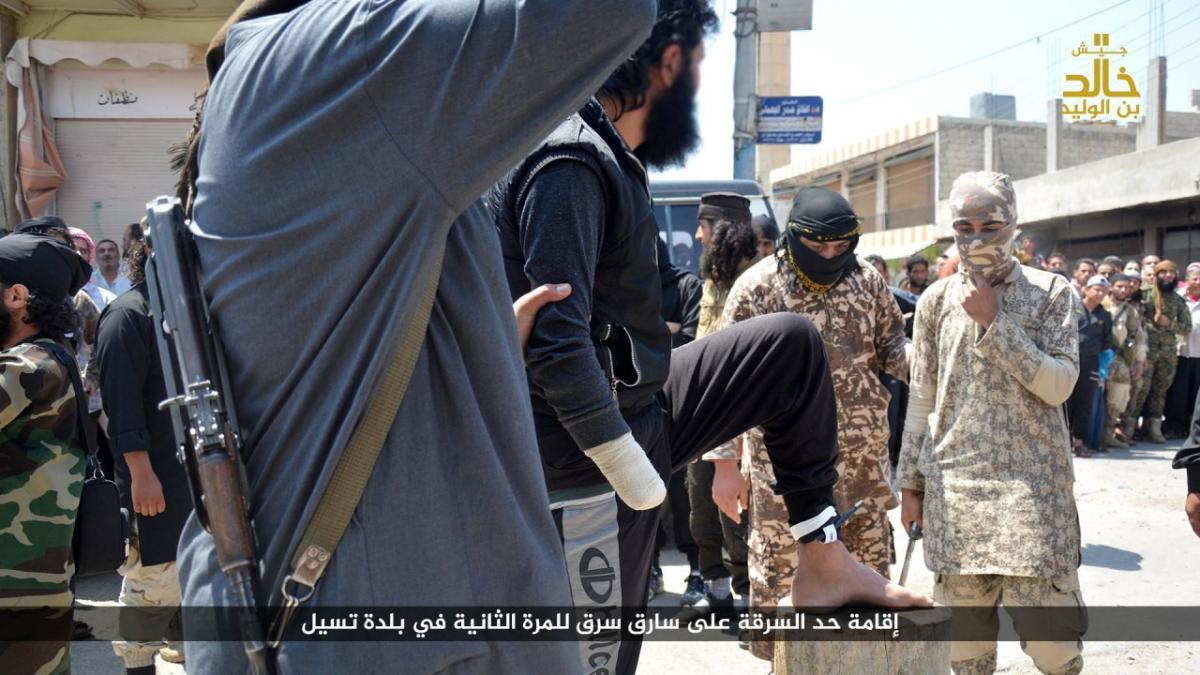
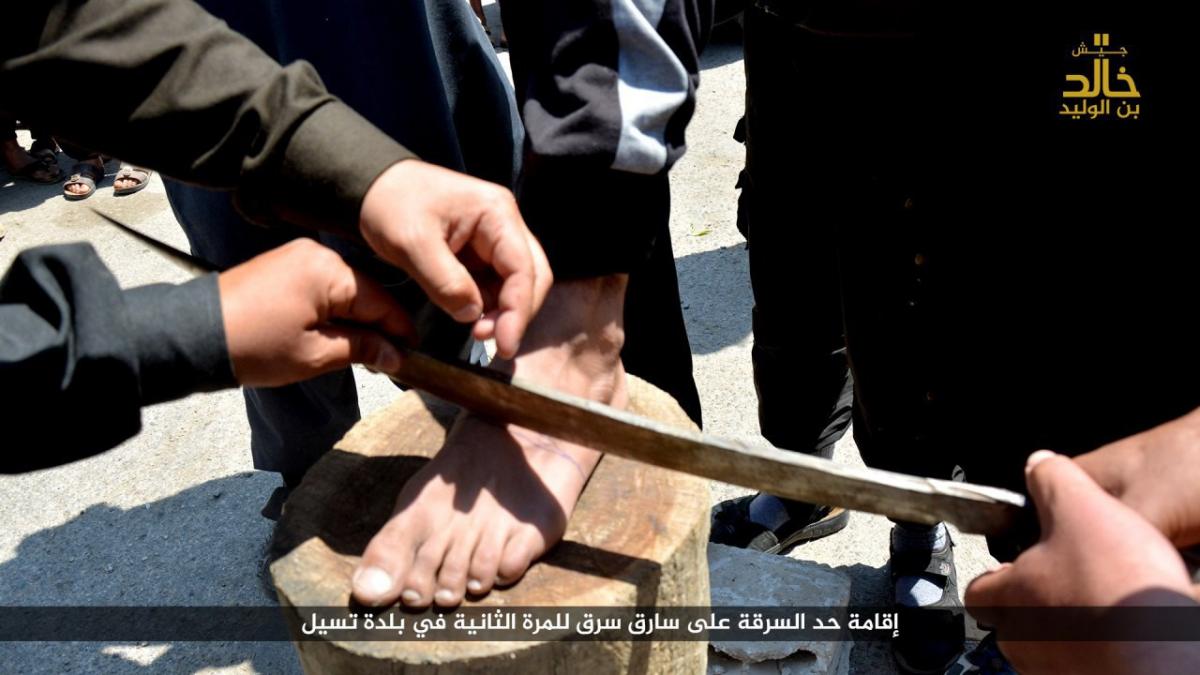
Amputating the left foot of a man convicted of theft, at the town square in Tasil. The man's right hand has already been amputated, indicating that this is his second conviction for theft. A large crowd of observers is gathered, as happens for such events in locales under ISIS control.[11]
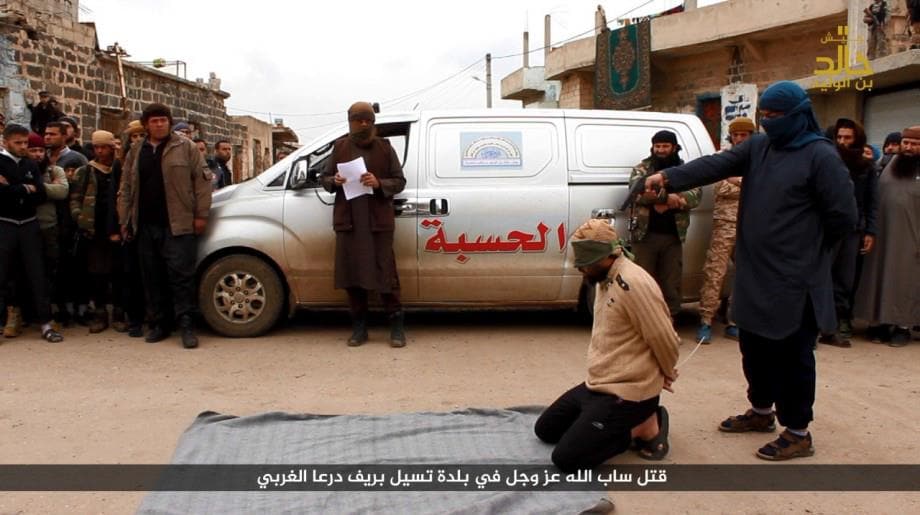
JKBW Hisbah members execute a man accused of blasphemy in the Tasil town square. Note Hisbah vehicle, similar to the ISIS Hisbah vehicles.[12]
The JKBW Hisbah's activity is also documented in a January 13, 2017 video titled "Matters [Requiring] Determination."[13] The video shows Hisbah members distributing informational material to local residents, lecturing in mosques to children and adults, carrying out enforcement of Islamic law at places of business, forcing businesses to close at prayer times, distributing shari'a-compliant clothing, burning cartons of confiscated cigarettes, destroying musical instruments, publicly chastising a man accused of adultery, and destroying gravestones to flatten graves and thus make them shari'a-compliant.
The final part of the video shows the public beheading of an elderly man, identified as Muhammad Ali, for the crime of sorcery.
As noted, the video includes a soundtrack of ISIS songs and content taken from the conceptual world of ISIS, even though the name of that organization, or of its leaders, are not mentioned once.
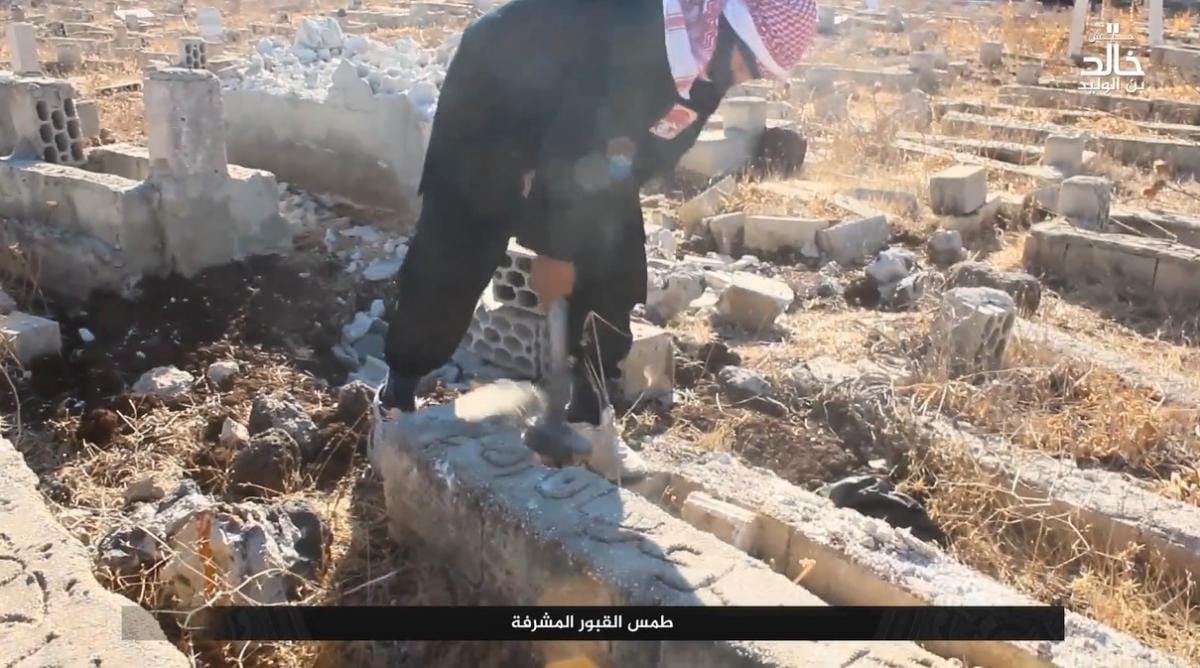
From the JKBW video: Hisbah members remove headstones to flatten the graves, in accordance with shari'a law.

From the JKBW video: Hisbah burns cartons of confiscated cigarettes.
Documenting Daily Life In JKBW Territory And On The Front Lines
Every week, the JKBW media unit releases several photo reports documenting daily life in the areas under the organization's control. These reports are identical in format and content to reports released by ISIS, and are likewise aimed at presenting the tranquility and security in the regions under JKBW control in southern Syria and the organization's ability to meet all the residents' needs. The photos show bustling marketplaces, children in school classrooms, maintenance work being carried out in the towns, and so on.

JKBW photo report: A tour of marketplaces in the Yarmouk Basin during Ramadan (June) 2017, showing peaceful life and active commerce.[14]
JKBW photo report: A JKBW fighter repairs a pipeline in the Yarmouk Basin, reflecting the organization's concern for the local residents' needs.[15]
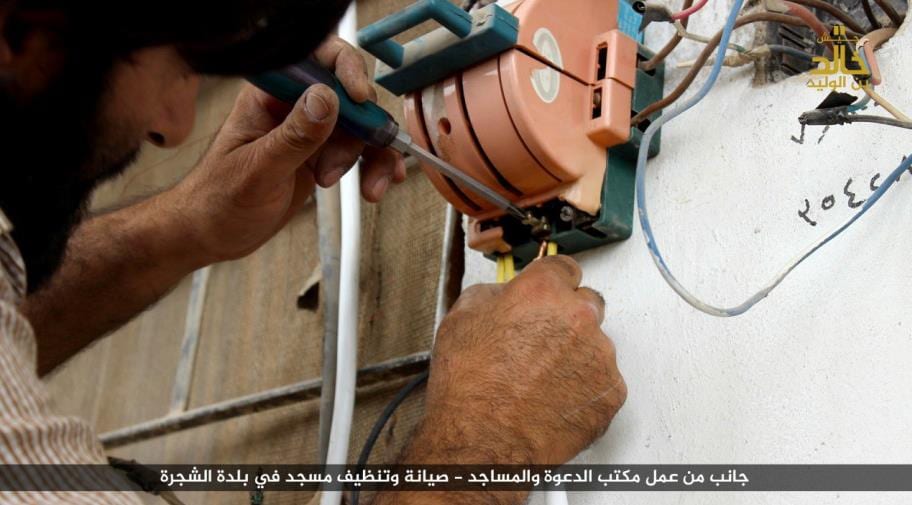
JKBW photo report: Fighters carrying out repairs at the Al-Shajara mosque in Shajarah, showing that the organization is in control of the situation and is taking care of maintenance for the residents. [16]
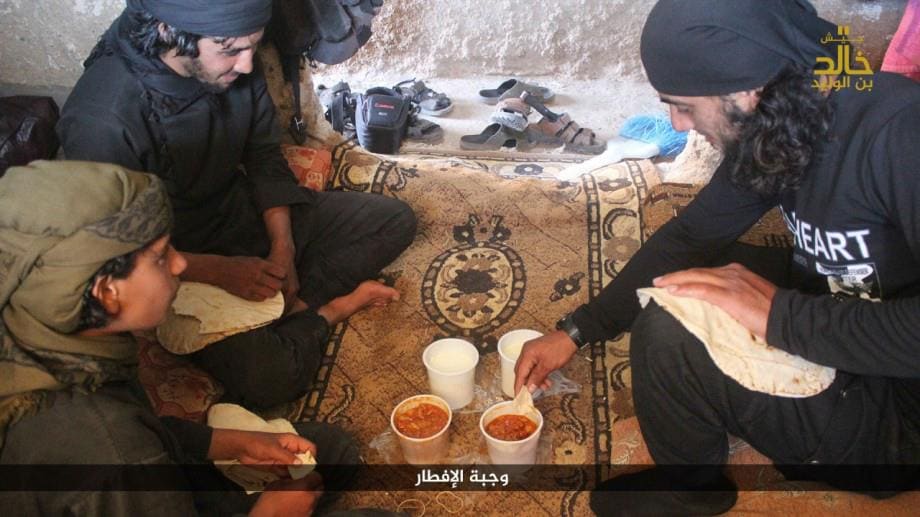
JKBW photo report: Fighters break their Ramadan fast at an iftar on the front line.[17] Similar reports are commonly published by ISIS media organizations.
Endnotes:
[1] Khalid bin Al-Walid was one of the prominent generals of the Islamic expansion, known especially for his conquests in the Levant, including a defeat of the Byzantine armies in southern Syria, in the Battle of Yarmouk in 636.
[2] Enabbaladi.net, June 29, 2017.
[3]See MEMRI JTTM report Two ISIS-Linked Groups In Southern Syria Join Ranks, April 12, 2016.
[4] Telegram.me/humat al-masra al-ikbariyya, June 10, 2016.
[5] Telegram.me/wakalat nasher news, June 4, 2017.
[6] For more on ISIS media uniformity, see MEMRI Inquiry & Analysis No. 1229, Understanding The ISIS Media Apparatus: Distribution Networks And Practices, February 19, 2016.
[7] Telegram.me/wakalat nasher news, June 10, 2017.
[8] Telegram.me/wakalat nasher news, June 3, 2017.
[9] Telegram.me/muasasat al-battar, May 10, 2017.
[10] Telegram.me/al-khilafa, Marcoh h 21, 2017.
[11] Telegram.me/naqel jaish Khalid bin al-walid, May 16, 2017.
[12] Telegram.me/al-khilafa, March 23, 2017.
[13] See MEMRI JTTM report ISIS Affiliate In Syria Releases Video Documenting The Activity Of Its Religious Police, January 16, 2017.
[14] Telegram.me/wakalat nasher news, June 10, 2017.
[15] Telegram.me/wakalat nasher news, May 22, 2017.
[16] Telegram.me/wakalat nasher news, June 1, 2017.
[17] Telegram.me/wakalat nasher news, May 25, 2017.




